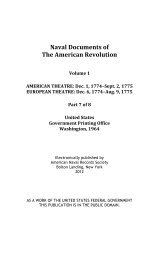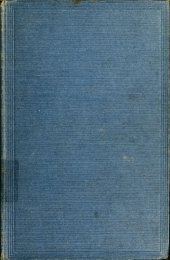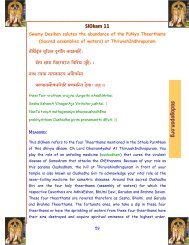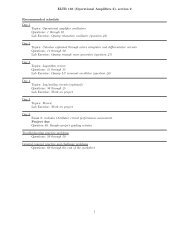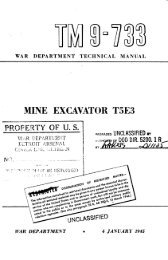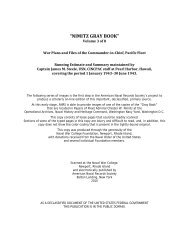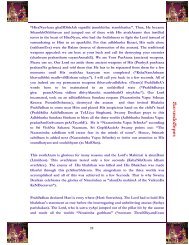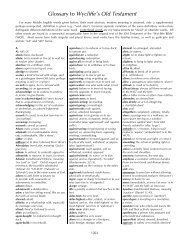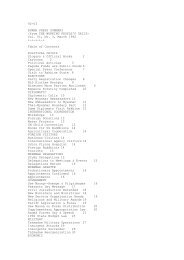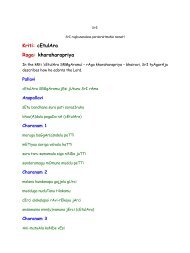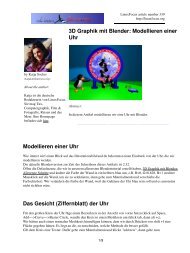You also want an ePaper? Increase the reach of your titles
YUMPU automatically turns print PDFs into web optimized ePapers that Google loves.
CHAPTER 19<br />
19.1 The Lady Iduna was at first inclined to view the conduct of the Prince of Athens as one of those<br />
passionate and passing ebullitions in which her long acquaintance with him had taught her he was<br />
accustomed to indulge. But when on retiring soon after to her apartments, she was informed by her<br />
attendant matron that she must in future consider herself a prisoner, and not venture again to quit them<br />
without permission, she began to tremble at the possible violence of an ill-regulated mind. She<br />
endeavoured to interest her attendant in her behalf; but the matron was too well schooled to evince any<br />
feeling or express any opinion on the subject; and indeed, at length, fairly informed Iduna that she was<br />
commanded to confine her conversation to the duties of her office.<br />
19.2 The Lady Iduna was very unhappy. She thought of her father, she thought of Iskander. The<br />
past seemed a dream; she was often tempted to believe that she was still, and had ever been, a prisoner<br />
in the Serail of Adrianople; and that all the late wonderful incidents of her life were but the shifting scenes<br />
of some wild slumber. And then some slight incident, the sound of a bell or the sign of some holy<br />
emblem, assured her she was in a Christian land, and convinced her of the strange truth that she was<br />
indeed in captivity, and a prisoner, above all others, to the fond companion of her youth. Her indignation<br />
at the conduct of Nicæus roused her courage; she resolved to make an effort to escape. Her rooms were<br />
only lighted from above; she determined to steal forth at night into the gallery; the door was secured. She<br />
hastened back to her chamber in fear and sorrow, and wept.<br />
19.3 Twice in the course of the day the stern and silent matron visited Iduna with her food; and as<br />
she retired, secured the door. This was the only individual that the imprisoned lady ever beheld. And<br />
thus heavily rolled on upwards of a week. On the eve of the ninth day, Iduna was surprised by the matron<br />
presenting her a letter as she quitted the chamber for the night. Iduna seized it with a feeling of curiosity<br />
not unmixed with pleasure. It was the only incident that had occurred during her captivity. She<br />
recognised the hand-writing of Nicæus, and threw it down with; vexation at her silliness in supposing, for<br />
a moment, that the matron could have been the emissary of any other person.<br />
19.4 Yet the letter must be read, and at length she opened it. It informed her that a ship had arrived<br />
from Athens at the coast, and that to-morrow she must depart for Italy. It told her also, that the Turks,<br />
under Mahomed, had invaded Albania; and that the Hungarians, under the command of her father, had<br />
come to support the Cross. It said nothing of Iskander. But it reminded her that little more than the same<br />
time that would carry her to the coast to embark for a foreign land, would, were she wise, alike enable<br />
Nicæus to place her in her father's arms, and allow him to join in the great struggle for his country and his<br />
creed. The letter was written with firmness, but tenderly. It left, however, on the mind of Iduna an<br />
impression of the desperate resolution of the writer.<br />
19.5 Now it so happened, that as this unhappy lady jumped from her couch, and paced the room in<br />
the perturbation of her mind, the wind of her drapery extinguished her lamp. As her attendant, or visitor,<br />
had paid her last visit for the day, there seemed little chance of its being again illumined. The miserable<br />
are always more unhappy in the dark. Light is the greatest of comforters. And so this little misfortune<br />
seemed to the forlorn Iduna almost overwhelming. And as she attempted to look around, and wrung her<br />
hands in very woe, her attention was attracted by a brilliant streak of light upon the wall, which greatly<br />
surprised her. She groped her way in its direction, and slowly stretching forth her hand, observed that it<br />
made its way through a chink in the frame of one of the great mirrors which were inlaid in the wall. And<br />
as she pressed the frame, she felt to her surprise that it sprang forward. Had she not been very cautious<br />
the advancing mirror would have struck her with great force, but she had presence of mind to withdraw<br />
her hand very gradually, repressing the swiftness of the spring. The aperture occasioned by the opening<br />
of the mirror consisted of a recess, formed by a closed-up window. An old wooden shutter, or blind, in so<br />
ruinous a state, that the light freely made its way, was the only barrier against the elements. Iduna,<br />
seizing the handle which remained, at once drew it open with little difficulty.<br />
19.6 The captive gazed with gladdened feelings upon the free and beautiful scene. Beneath her<br />
rose the rich and aromatic shrubs tinged with the soft and silver light of eve: before her extended wide<br />
and fertile champaign, skirted by the dark and undulating mountains: in the clear sky, glittering and sharp,<br />
sparkled the first crescent of the new moon, an auspicious omen to the Moslemin invaders.<br />
19.7 Iduna gazed with, joy upon the landscape, and then hastily descending from the recess, she<br />
placed her hands to her eyes, so long unaccustomed to the light. Perhaps, too, she indulged in<br />
40



